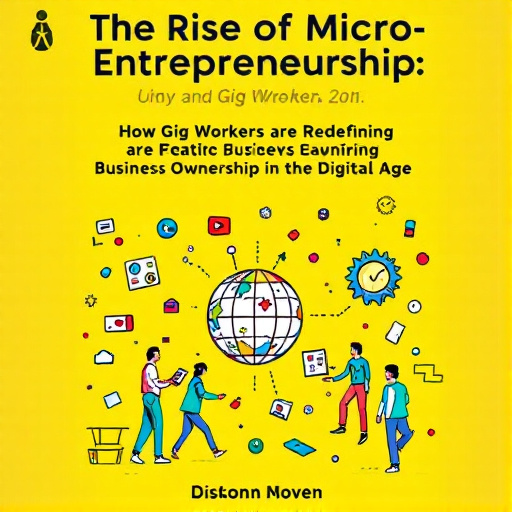Featured Articles
- 7 Best AI-Powered Marketing Platforms Released Since 2019 That Will Supercharge Your Startup Growth
- 9 Proven Psychological Tricks Entrepreneurs Use to Influence Buyers and Skyrocket Sales
- "From Side Hustle to Mainstream: The Surprising Rise of Entrepreneurial Niche Communities"
- The Rise of 'Accidental Entrepreneurs': How Unexpected Events Spark New Business Ventures
- The Rise of Eco-Entrepreneurship: How Green Startups Are Transforming Traditional Industries
The Rise of Eco-Entrepreneurship: How Green Startups Are Transforming Traditional Industries
The Rise of Eco-Entrepreneurship: How Green Startups Are Transforming Traditional Industries
The emergence of eco-entrepreneurship is reshaping traditional industries by integrating sustainability into business models and appealing to conscious consumers. As green startups proliferate, they are not only generating profit but also fostering a significant cultural shift towards environmental responsibility.
The Spark of Eco-Entrepreneurship
Imagine a world where entrepreneurship isn’t solely about making money but also about making a difference. For many, this notion is becoming a reality. A study from the *Global Entrepreneurship Monitor* revealed that nearly 50% of millennials are motivated by social and environmental vision when starting their own ventures. Intriguingly, up to 60% of these eco-minded entrepreneurs are aged between 18 and 34, showcasing a generational shift toward sustainable capitalism.
Turning Waste into Gold
One of the most remarkable aspects of eco-entrepreneurship is its innovative approach to waste. Let’s take the example of a company called Recycling Technologies, which is tackling plastic waste head-on. They’ve developed a machine that converts unrecyclable plastics back into oil, effectively closing the loop on a material that so often ends up in landfills. According to the *World Economic Forum*, if plastic production continues at its current rate, plastics could outnumber fish in oceans by 2050. Solutions like this are not just clever; they are necessary.
(Un)Common Sense: Why Go Green?
Now, you might be asking, “What’s the point?” This is where the persuasive edge of eco-entrepreneurship shines. Switching to sustainable practices can yield significant financial benefits. The consultancy firm *McKinsey* reports that companies who invest in sustainability initiatives can save, on average, 20% on operational costs. Additionally, consumers are increasingly demanding eco-friendly products, with 73% of U.S. consumers admitting they would change their consumption habits to reduce environmental impact (Nielsen).
Pavlov’s Eco-Dogs: The Impact of Consumer Behavior
Speaking of consumers, let’s throw in a little humor here. It’s as though consumers have become a bunch of well-trained eco-dogs; they respond to “sit” and “stay” when it comes to green products, motivated by the squeaky toys of social media and awareness campaigns. For instance, the boom in plant-based food startups like *Beyond Meat* and *Impossible Foods* showcases how taste, health, and ethics can align with financial success. In fact, a plant-based paradigm shift could cut carbon emissions from the agricultural sector by up to 70% by 2050, as reported by the *World Resources Institute*.
Case Study: A Sustainable Winner
Let’s dive deeper into a captivating story: that of *Patagonia*, a pioneer in the eco-entrepreneurship movement. Founded in the 1970s by Yvon Chouinard, Patagonia has long embraced the philosophy of “do no harm.” They’ve adopted practices such as using recycled materials in their clothing and committing 1% of sales to environmental causes. In one notable campaign, they urged customers to “Don’t Buy This Jacket,” highlighting the environmental cost of consumerism while paradoxically boosting their brand loyalty and sales. This rebellious act not only garnered media attention but also reinforced their standing as an ethical leader in the outdoor industry.
The Little Things Matter
Sometimes, it's the little guys making big differences. Meet *Bamboo Straws*, a startup that’s all about ditching single-use plastics for eco-friendly bamboo alternatives. Their mission is simple: to make straws fashionable again... just in a more sustainable way! Customers can purchase these charming straws while feeling good about reducing plastic waste; it’s a win-win that speaks to a growing demographic of eco-conscious consumers.
Innovating Traditional Industries
So, how are these green startups transforming traditional industries? By challenging established practices, they’re proving that sustainability is not just an add-on; it’s an essential component of modern business. For example, the fashion industry has notoriously been one of the dirtiest in the world, generating around 10% of global carbon emissions. However, new startups like *Everlane* and *Allbirds* are changing that narrative with transparency in production and sustainable materials.
Heartfelt Change Over Hype
While passion is essential, the journey of an eco-entrepreneur often contains hurdles more daunting than a wind turbine on a windy day. Take *TOMS Shoes*, for instance; their “one-for-one” model, which donates a pair of shoes for every pair sold, garnered them global acclaim. However, they had to redevelop their model to ensure the long-term sustainability of the communities they were helping. This illustrates that while the intent is crucial, it’s the execution that determines impact.
Financial Backing for Green Dreams
Investors are starting to take notice. According to *Bloomberg*, investment in sustainable startups surged to $20 billion in 2020 alone. Institutions are recognizing that backing eco-friendly initiatives isn’t only ethical; it’s also a solid investment strategy. The 2022 *Morgan Stanley* report revealed that sustainable investing has outperformed traditional investing benchmarks by 10% in the last decade. Green is no longer just a trend; it’s a sound investment principle.
The Ripple Effect
As more eco-entrepreneurs enter the market, the ripple effect spreads far beyond their individual businesses. With their innovative practices, they're reshaping supply chains, influencing consumer behavior, and challenging regulatory norms. It’s like throwing a pebble into a pond, creating waves that reach every corner of the economy.
Regulatory Hurdles: Can We Change the Game?
However, with great change comes great resistance. Regulatory hurdles can stifle innovation, especially as traditional industries fight to maintain their status quo. In some regions, laws favor established industries, making it challenging for green startups to compete. But as consumer demand for sustainability grows, companies who don't adapt risk becoming obsolete. As the great economist John Maynard Keynes once said, “The difficulty lies not so much in developing new ideas as in escaping from old ones.”
A Call to Action
For our aspiring young entrepreneurs aged 16 to 70 reading this, now is your time to act! The theme of this decade is clearly green. Whether you have a business idea focused on making eco-friendly products or a service that promotes sustainability, there’s never been a better time to dive in. Remember, as an eco-entrepreneur, you're not just starting a business—you’re joining a movement. And who knows? You might even change the world, one green idea at a time.
Conclusion: A Brighter Future Awaits
The rise of eco-entrepreneurship is more than just a business trend; it signifies a broader cultural shift toward sustainability. By transforming traditional industries, green startups are impacting our economy, our society, and, most importantly, our planet. It may be a while before we arrive at a perfect world, but with every innovative step taken by today's eco-entrepreneurs, we are surely paving the way toward a brighter and greener future.



